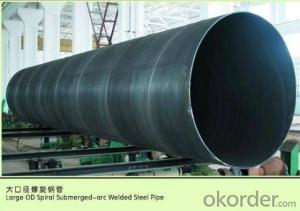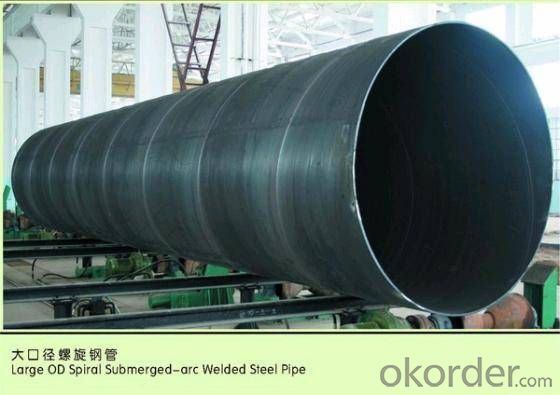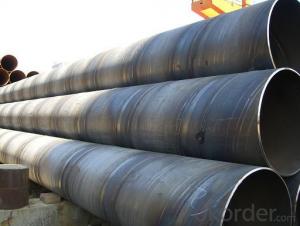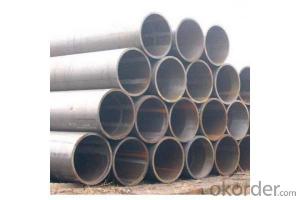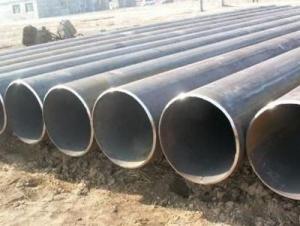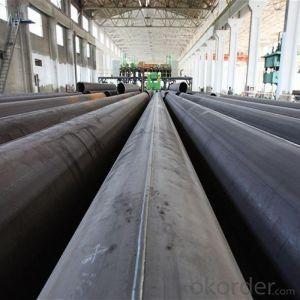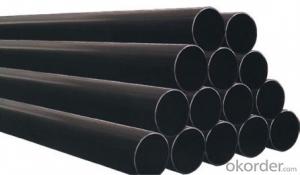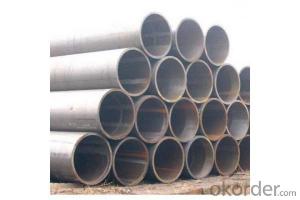API SSAW LSAW CARBON STEEL PIPE LINE OIL GAS PIPE 18’‘
- Loading Port:
- Tianjin
- Payment Terms:
- TT OR LC
- Min Order Qty:
- 5 m.t.
- Supply Capability:
- 3000 m.t./month
OKorder Service Pledge
OKorder Financial Service
You Might Also Like
Packaging & Delivery
Packaging Detail: | standard export packing or as customer's requirement |
Delivery Detail: | within 10 - 30 days |
Specifications
Spiral Welded Steel Pipes and Tubes
1.Material:Q195-Q235
2.Length:1-12m
3.WT:1.0-14mm
4.O.D.:20-273mm
Spiral Welded Steel Pipes and Tubes
Product Description:
1.Material : Q235,Q345,L245,L290,L360,L415,L450,L485,GrB,X42,46,X52,X56,X60,X65,X70,X80,X100
2,Standard: SY/T5037-2000,GB/T9711-2011,API Spec 5L PSL1/PSL2,ASTM A252\A53,ISO3183,DIN17172,EN10217,JIS G3457,AWWA C200,ASTM A139,ASTM A671,ASTM A672
3.Wall thickness: 3.0mm-30mm
4.Outer diameter: φ168mm-3020mm
5,Length: 5m-12m or as your requirement
6,Corrosion protection standard: DIN30670,DIN30671, AWWAC210, AWWA C203, SY/T0413-2002,SY/T0414-2002
7,Application: Oil, gas, natural gas, water pipe, thermal electricity pipe, steel structure engineering, etc
Q195-q345 Material Steel Pipe's Materials
Elements | Chemical Compsition% | Mechanical Property | ||||||
C% | Mn% | S% | P% | Si% | Yield Point (Mpa) | Tensile Strength(Mpa) | Elongation | |
Q195 | 0.06-0.12 | 0.25-0.50 | <0.050< span=""> | <0.045< span=""> | <0.030< span=""> | >195 | 315-430 | 32-33 |
Q215 | 0.09-0.15 | 0.25-0.55 | <0.05< span=""> | <0.045< span=""> | <0.030< span=""> | >215 | 335-450 | 26-31 |
Q235 | 0.12-0.20 | 0.30-0.70 | <0.045< span=""> | <0.045< span=""> | <0.030< span=""> | >235 | 375-500 | 24-26 |
Q345 | <0.20< span=""> | 1.0-1.6 | <0.040< span=""> | <0.040< span=""> | <0.55< span=""> | >345 | 470-630 | 21-22 |
Packaging & Delivery
Packaging Detail: | Normal exporting packing,in container or bulk vessel or as per clients' request |
Delivery Detail: | 2 months after confimed contract |
Specifications
Large Diameter API 5L X70 PSL2 LSAW Steel Pipe
Grade: X42, X46, X50, X52, X60, B, C
OD: 1.5"-28"
WT: SCH10-SCH160
Large Diameter API 5L X70 PSL2 LSAW Steel Pipe
Specifications:
u Standard: API 5L
u Grade: B, C, X42, X46, X50, X52, X56, X60, X65, X70, X80
u OD: 1.5"-28"
u WT: SCH10-SCH160
u Length: 5-12m
u Ends Finish: plain end, bevel end, grooved end
u Surface Treatment: bare, black varnished, oiled finish, red color, anti-corrosion, 3PE, FBE or epoxy coating
u Technique: hot rolled or cold drawn
u Application: api 5l steel pipe for conveying oil, water, gas
u Invoicing: based on theoretical weight or actual weight
u Payment Terms: L/C at sight, T/T or Western Union
u Trade Terms: FOB, CFR, CIF
u Certification: ABS manufacturing assessment, ABS design assessment, API 5CT, API 5L, DNV manufacturer certificate, ISO9001 quality management system certificate, ISO14001 environment management system certificate, GB/T28001 occupational health and safety management system certificate, A1 class manufacturing license of special equipment certificate, CCS, GL, LR, SGS, TüV, PDE
- Q: Can steel pipes be used for underground oil pipelines?
- Indeed, underground oil pipelines can utilize steel pipes. The construction of underground oil pipelines heavily relies on steel pipes owing to their robustness, longevity, and resistance to corrosion. They possess the capability to endure the immense pressure and weight exerted by the oil being transported, along with external forces like soil displacement or seismic events. Moreover, steel pipes can be fortified with coatings or linings such as epoxy or polyethylene, enhancing their resistance to corrosion and extending their lifespan. In conclusion, steel pipes emerge as a dependable and extensively employed option for underground oil pipelines.
- Q: What are the properties of steel that make it suitable for pipe manufacturing?
- Steel is a highly preferred material for pipe manufacturing due to its unique properties. Firstly, steel exhibits exceptional strength and durability, making it capable of withstanding high pressure and extreme temperatures. This strength ensures that steel pipes can safely transport fluids and gases over long distances without the risk of leakage or breakage. Another important property of steel is its resistance to corrosion. Steel pipes are often exposed to various corrosive substances such as water, chemicals, and gases, which can degrade other materials over time. However, steel is highly resistant to corrosion, resulting in long-lasting and reliable pipes. Additionally, steel is a highly versatile material, allowing for various pipe sizes and shapes to be manufactured. Steel pipes can be customized to meet specific project requirements, making them suitable for a wide range of applications such as water supply, oil and gas transmission, sewage systems, and structural support. Moreover, steel is known for its excellent thermal conductivity, which is crucial for applications involving the transportation of hot or cold fluids. Steel pipes efficiently transfer heat, ensuring minimal energy loss during the process. Furthermore, steel is a recyclable material, making it an environmentally friendly option for pipe manufacturing. Steel pipes can be recycled and reused, reducing the need for new raw materials and minimizing waste generation. In conclusion, the properties of strength, durability, corrosion resistance, versatility, thermal conductivity, and recyclability make steel an ideal choice for pipe manufacturing. These properties ensure the reliability, efficiency, and longevity of steel pipes in various industries and applications.
- Q: What are the different end types for steel pipes?
- There are several different end types for steel pipes, including plain ends, beveled ends, threaded ends, and grooved ends. Plain ends are smooth and do not have any special features. Beveled ends are cut at an angle to facilitate welding. Threaded ends have threads that allow for easy installation with other fittings. Grooved ends have grooves that enable quick and secure connections using couplings.
- Q: Can steel pipes be used for shipbuilding?
- Certainly, shipbuilding can make use of steel pipes. Steel is a widely employed material in ship construction owing to its robustness, endurance, and resistance to corrosion. Steel pipes serve multiple purposes in shipbuilding, encompassing the manufacture of the vessel's hull, superstructure, and various internal systems such as plumbing, ventilation, and fuel lines. The strength and structural integrity of steel pipes render them suitable for enduring the unforgiving conditions encountered at sea, including high pressures, extreme temperatures, and exposure to saltwater. Furthermore, steel pipes can be easily welded and shaped to meet the precise requirements of shipbuilding, making them an adaptable choice for this industry.
- Q: How are steel pipes used in the agriculture sector?
- Steel pipes are commonly used in the agriculture sector for various purposes, such as irrigation systems, drainage systems, and structural support for farm buildings and infrastructure. They are also used for conveying water, chemicals, and other fluids, as well as for constructing fencing and livestock enclosures. Moreover, steel pipes are utilized in the construction of machinery and equipment essential for farming operations.
- Q: Are steel pipes suitable for hydronic heating systems?
- Yes, steel pipes are suitable for hydronic heating systems. Steel pipes are known for their durability, strength, and resistance to high temperatures and pressure, making them an excellent choice for circulating hot water in hydronic heating systems. They can effectively handle the demands of heating systems and provide reliable and long-lasting performance.
- Q: Are steel pipes suitable for pharmaceutical manufacturing facilities?
- Yes, steel pipes are suitable for pharmaceutical manufacturing facilities. Steel pipes are commonly used in pharmaceutical manufacturing due to their excellent corrosion resistance and durability. They can withstand high pressure and temperature conditions, making them ideal for various applications such as transporting fluids, gases, and chemicals within the facility. Additionally, steel pipes can be easily cleaned and sanitized, ensuring the integrity and safety of pharmaceutical products. Furthermore, steel pipes are cost-effective and have a long service life, making them a reliable choice for pharmaceutical manufacturing facilities.
- Q: How are steel pipes used in the marine industry?
- Steel pipes are commonly used in the marine industry for various applications such as shipbuilding, offshore oil and gas exploration, and marine infrastructure. They are utilized for constructing hulls, pipelines, and support structures due to their high strength, durability, and resistance to corrosion from seawater. Steel pipes also provide a reliable and efficient means of transporting fluids, gases, and other materials within marine vessels and structures.
- Q: How are steel pipes inspected for quality?
- Steel pipes are inspected for quality through various methods such as visual inspection, non-destructive testing techniques like ultrasonic testing, magnetic particle inspection, and radiographic testing. These inspections help identify any defects, cracks, or imperfections in the pipes, ensuring they meet the required quality standards. Additionally, mechanical tests such as tensile strength and hardness tests may also be conducted to assess the structural integrity of the steel pipes.
- Q: What is the cost of steel pipes compared to other piping materials?
- The cost of steel pipes can vary based on factors like size, grade, and specifications, as well as market conditions and location. Generally, steel pipes are more expensive than materials like PVC or HDPE. However, when compared to materials like copper or stainless steel, steel pipes can often be more cost-effective. Steel pipes are known for their durability, strength, and resistance to high pressures and temperatures, making them suitable for various applications such as oil and gas pipelines, plumbing systems, and structural supports. Their longevity and reliability can offset the initial higher cost, as they require less maintenance and have a longer lifespan than other materials. Moreover, steel pipes are readily available in different sizes and grades, making them versatile and adaptable to different project requirements. This availability and versatility contribute to their cost-effectiveness, as they can be easily sourced and customized to specific needs. It is important to consider that prices for steel pipes can fluctuate due to market conditions and factors like raw material costs, transportation expenses, and labor charges. Therefore, it is advisable to consult with suppliers or industry experts for accurate pricing information based on specific project specifications and market conditions.
Send your message to us
API SSAW LSAW CARBON STEEL PIPE LINE OIL GAS PIPE 18’‘
- Loading Port:
- Tianjin
- Payment Terms:
- TT OR LC
- Min Order Qty:
- 5 m.t.
- Supply Capability:
- 3000 m.t./month
OKorder Service Pledge
OKorder Financial Service
Similar products
Hot products
Hot Searches
Related keywords
